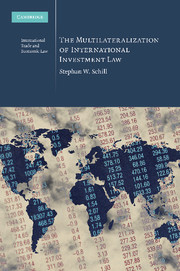Book contents
- Frontmatter
- Contents
- Preface
- List of figures
- Table of treaties, draft instruments, and related documents
- Table of cases
- I Introduction: globalization and international investment law
- II The dynamics of multilateralism and bilateralism in international investment relations
- III Treaty negotiation and multilateralization of international investment law
- IV Multilateralization through most-favored-nation treatment
- V Multilateralization and corporate structuring
- VI Multilateral enforcement of international investment law
- VII Multilateralization through interpretation: producing and reproducing coherence in investment jurisprudence
- VIII Conclusion: multilateralization – universalization – constitutionalization
- Bibliography
- Index
IV - Multilateralization through most-favored-nation treatment
Published online by Cambridge University Press: 06 January 2010
- Frontmatter
- Contents
- Preface
- List of figures
- Table of treaties, draft instruments, and related documents
- Table of cases
- I Introduction: globalization and international investment law
- II The dynamics of multilateralism and bilateralism in international investment relations
- III Treaty negotiation and multilateralization of international investment law
- IV Multilateralization through most-favored-nation treatment
- V Multilateralization and corporate structuring
- VI Multilateral enforcement of international investment law
- VII Multilateralization through interpretation: producing and reproducing coherence in investment jurisprudence
- VIII Conclusion: multilateralization – universalization – constitutionalization
- Bibliography
- Index
Summary
The interest of States in a multilateral and non-discriminatory investment regime exists not only on a theoretical level, but positively surfaces in the normative framework that bilateral investment treaties establish. A specific and express normative basis for the multilateralization of investment relations are above all most-favored-nation (“MFN”) clauses that are regularly incorporated in bilateral, regional, and sectoral investment treaties as one of the central principles governing international investment relations. MFN clauses in investment treaties are generally reciprocal, unconditional, and indeterminate in nature. A typical MFN clause in a BIT thus provides that:
neither contracting party shall subject investments in its territory owned or controlled by nationals or companies of the other contracting party to treatment less favourable than it accords … to investments of nationals or companies of any third State; and
neither contracting party shall in its territory subject nationals or companies of the other contracting party, as regards their activity in connection with investments, to treatment less favourable than it accords … to nationals or companies of any third State.
MFN clauses oblige the State granting MFN treatment to extend to the beneficiary State the treatment accorded to third States in case this treatment is more favorable than the treatment under the treaty between the granting and the beneficiary State. The clauses break with general international law and its bilateralist rationale that, in principle, permits States to accord differential treatment to different States and their nationals, and instead ensure equal treatment between the State benefiting from MFN treatment and any third State.
- Type
- Chapter
- Information
- The Multilateralization of International Investment Law , pp. 121 - 196Publisher: Cambridge University PressPrint publication year: 2009
- 2
- Cited by

